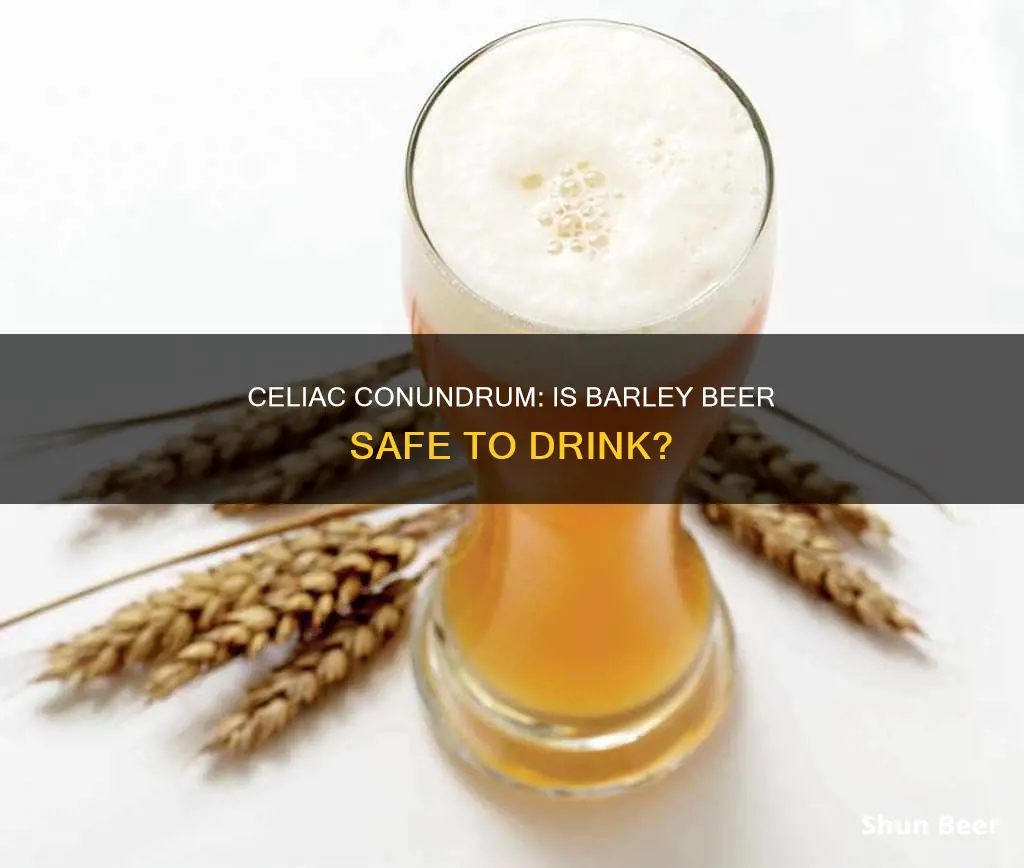
Celiac disease is an autoimmune disorder that affects the small intestine and prevents the body from properly absorbing nutrients. When someone with celiac disease consumes gluten, a protein found in wheat, barley, and rye, the immune system reacts by damaging the small intestine. This can lead to weight loss, fatigue, anemia, and other serious health problems. The only treatment for celiac disease is to follow a strict gluten-free diet, which means avoiding all foods and drinks that contain gluten, including beer.
Beer is typically made from a combination of malted barley and hops, and sometimes wheat, all of which contain gluten. Since the development of gluten-removed beers, there has been controversy over whether people with celiac disease can safely consume these beverages. The current consensus is that gluten-removed beers are not yet safe for those with celiac disease, as there is no scientifically validated test to confirm the removal of all gluten particles. These particles can still cause intestinal damage in people with celiac disease.
While those with celiac disease should generally avoid beer, there are gluten-free options available. Some breweries make beer with naturally gluten-free grains, such as sorghum, rice, or quinoa, or use a process called enzymatic deamination to remove gluten. Additionally, some beers are made with barley or wheat but use a special enzyme to break down gluten proteins, resulting in gluten-removed rather than gluten-free beer. However, it is important to note that even gluten-free beers may still contain enough gluten to trigger symptoms in people with celiac disease.
| Characteristics | Values |
|---|---|
| Can celiacs drink barley beer? | No, conventional beer is not gluten-free. |
| Why? | Beer is typically made from barley, which contains gluten. |
| What about gluten-removed barley beer? | The current consensus is that gluten-removed beers are not yet safe for those with celiac disease. |
| What alcoholic drinks can celiacs drink? | Ciders, wines, spirits, port, liqueurs, and gluten-free beers. |
What You'll Learn

Celiac disease and gluten-free beer
Celiac disease is an autoimmune disorder that affects the small intestine and prevents the body from properly absorbing nutrients. When someone with celiac disease consumes gluten, the body's immune system reacts by damaging the small intestine. Gluten is a protein found in wheat, barley, and rye.
Beer is typically made from a combination of malted barley and hops, and sometimes wheat is also used in the beer-making process. Since both barley and wheat contain gluten, beers made from either are not gluten-free. Therefore, people with celiac disease should not drink conventional beer.
However, there are now several gluten-free beers available on the market that are brewed using gluten-free grains like millet, sorghum, and rice. These beers do not contain barley or wheat, making them suitable for people with celiac disease. Examples of popular gluten-free beer brands include Estrella Damm Daura, Omission Beer, New Planet Beer, Redbridge, and Green's Endeavor.
It is important to note that even if a beer is labelled "gluten-free", it may still contain enough gluten to trigger symptoms and intestinal damage in people with celiac disease. Additionally, there is a risk of cross-contamination during the manufacturing process, even in beers that are not specifically labelled as gluten-free. Therefore, it is advisable for people with celiac disease to carefully check the labels and, if needed, contact the manufacturer to ensure that a beer is truly gluten-free.
For those with celiac disease who wish to consume alcoholic beverages, there are several options available besides beer. Cider, wine, sherry, spirits, port, and liqueurs are naturally gluten-free. Distilled spirits only contain gluten if gluten-containing ingredients are added after the distillation process. In this case, labelling legislation ensures that the product label clearly states if wheat, barley, rye, or oats have been added. Pure distilled liquors are also generally safe for those with celiac disease.
In conclusion, while conventional beer is not gluten-free, people with celiac disease can still enjoy a variety of gluten-free beers and other alcoholic beverages. However, it is important to carefully check labels and consult with a doctor or nutritionist to ensure safe consumption.
Wisconsin's Non-Alcoholic Beer Laws: Underage Drinking
You may want to see also

The health risks of drinking beer with celiac disease
Drinking beer can be risky for those with celiac disease, an autoimmune disorder that affects the small intestine and prevents the body from properly absorbing nutrients. When someone with celiac disease consumes gluten, a protein found in wheat, barley, and rye, their immune system reacts by damaging the small intestine. This can lead to a range of health issues, including weight loss, fatigue, anemia, and other serious problems.
The only treatment for celiac disease is to follow a strict gluten-free diet, avoiding all foods and drinks that contain gluten. This includes most conventional beers, which are typically made from barley or wheat and, therefore, contain gluten. Even if a beer is gluten-free, cross-contamination could occur during the brewing process, for example, from "fermenter sources."
Consuming gluten-containing products can worsen the symptoms of celiac disease, which include digestive issues such as abdominal pain, nausea, and diarrhea, as well as fatigue and other health complications. Repeated ingestion of gluten can further trigger the disease and cause additional intestinal damage over time.
There is also a possibility that drinking alcohol could make the symptoms of celiac disease worse or lead to long-term complications. Some research suggests that alcohol consumption may impair the body's absorption of essential nutrients and exacerbate symptoms like nausea, bloating, abdominal pain, gas, and diarrhea. Additionally, drinking alcohol may increase the risk of developing long-term complications of celiac disease, such as osteoporosis and anemia.
Therefore, it is generally recommended that people with celiac disease avoid alcoholic beverages, including beer, as much as possible. However, there are now several gluten-free beer options available, which are considered safe for people with celiac disease. These beers are made with gluten-free grains, such as sorghum, rice, or quinoa, or have the gluten removed through a specific process. It is important to carefully check labels and consult a doctor or nutritionist when in doubt.
Understanding Beer Quantities: 16 Oz Beers and Their Drink Equivalents
You may want to see also

Gluten-removed beers and their safety for celiacs
Gluten-removed beer is made using traditional ingredients like barley, which contains gluten, and then uses an enzyme to break down the gluten to reduce the overall gluten content to below 20 parts per million (ppm). This process means that gluten-removed beers taste more like traditional beers.
The current consensus is that gluten-removed beers are not yet safe for people with celiac disease. This is because there is no scientifically validated test to confirm that all gluten has been removed from the final product. Gluten particles are broken down during the removal process, and current tests may not be able to identify these smaller particles, which can still cause intestinal damage in people with celiac disease.
There are two types of gluten-free beer: naturally gluten-free beer and gluten-removed gluten-free beer. Naturally gluten-free beers are made with all gluten-free ingredients, such as rice, sorghum, buckwheat, and millet, and are guaranteed to be gluten-free from start to finish. Hard ciders, distilled liquors, and wines are also typically safe for people with celiac disease.
By law, manufacturers can only label a beer gluten-free if it contains 20 ppm or less of gluten. Additionally, a gluten-removed gluten-free beer made from barley must, by allergen labelling law, state on the label that it 'contains barley'. When purchasing any beer or cider, it is important to read the labels carefully and, if the gluten content is unclear, ask the manufacturer.
GABA and Beer: Is It Safe to Mix?
You may want to see also

The symptoms of celiac disease
Celiac disease is an autoimmune disorder that affects around 1 in 100 people worldwide. The disease damages the villi, the finger-like projections in the intestine that absorb nutrients. This damage limits overall nutrient absorption and can lead to a number of health issues. The only way for someone with celiac disease to avoid symptoms is to follow a strict gluten-free diet.
- Digestive issues: Chronic diarrhea, constipation, abdominal pain, bloating, and fatty stool that floats are common symptoms in children and adults.
- Malabsorption: Malabsorption of nutrients can lead to weight loss, growth failure, and nutrient deficiencies such as iron deficiency anemia.
- Mental health issues: Celiac disease can cause irritability, anxiety, and depression.
- Skin problems: A rash called dermatitis herpetiformis, which is intensely itchy, is associated with celiac disease.
- Neurological issues: Peripheral neuropathy, or nerve damage in the extremities, can cause tingling in the legs and feet. "Brain fog", or mental fatigue and forgetfulness, is also a symptom.
- Other health issues: Celiac disease can cause infertility, osteoporosis, mouth sores, discoloured teeth, and joint pain.
It is important to note that even individuals with asymptomatic celiac disease will still sustain intestinal damage if they consume gluten, and should therefore strictly avoid it.
Drinking Beer in Marrakech: What's the Deal?
You may want to see also

Other gluten-free alcoholic drinks
As a celiac, you should avoid drinking conventional beer, as it is typically made from a combination of malted barley and hops, and sometimes wheat—all of which contain gluten. However, there are plenty of gluten-free alcoholic drinks to choose from.
Wine and Brandy
Wine and brandy are usually gluten-free, but it's best to double-check the ingredients on fruit-flavoured wines and wine cocktails, as these may contain gluten.
Rum and Tequila
Plain rum and tequila are gluten-free. However, some flavoured and spiced rums may contain gluten, so always check with the manufacturer if you're unsure. Similarly, some cheaper tequila brands are considered "mixto", meaning they are not entirely made from the gluten-free blue agave plant and may contain gluten.
Hard Cider
Hard cider is usually gluten-free, but it's best to choose gluten-free-labelled ciders to be safe.
Mixed Drinks
Mixed drinks often include gluten-containing ingredients, so it's important to stick with gluten-free mixers such as gluten-free soda or fruit juice.
Gluten-Free Liquors
Liquors like vodka, bourbon, whiskey, scotch, gin, and brandy are gluten-free, even if they are made with gluten-containing grains. This is because the distillation process removes the gluten protein from the end product. However, some people with celiac disease or gluten sensitivity may still react to these liquors, so proceed with caution.
Gluten-Free Beer
While most beer contains gluten, there are now several gluten-free options available, such as Redbridge, Bard's, New Grist, New Planet, and Greens. These beers are made from gluten-free grains such as sorghum, millet, and rice.
Will Beer Affect Your Blood Test?
You may want to see also
Frequently asked questions
Conventional beer is not gluten-free and therefore unsafe for celiacs to drink. Barley contains gluten, which can trigger a reaction in people with celiac disease.
Celiacs can safely consume cider, wine, sherry, spirits, port, and liqueurs, as these drinks are gluten-free. Pure distilled liquors are also safe for celiacs to drink. There are also gluten-free beers available, which are made with gluten-free grains such as sorghum, rice, or quinoa.
If a person with celiac disease drinks barley beer, they risk additional health complications. They may experience digestive issues such as abdominal pain, nausea, and diarrhea, as well as fatigue and other health issues. Repeated ingestion of gluten can trigger the disease and cause intestinal damage.
Some popular gluten-free beer brands include Estrella Damm Daura, Omission Beer, New Planet Beer, Redbridge, Green's Endeavor, and Budweiser Brew Free or Die.







